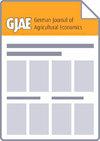The Political Economy of Fostering a Wood-based Bioeconomy in Germany
IF 0.7
4区 经济学
Q4 AGRICULTURAL ECONOMICS & POLICY
引用次数: 40
Abstract
To increase the sustainability of economic processes and products as well as the use of sustainable resource inputs, a transition is required from the hitherto predominantly fossil resource-based “throughput economy” towards a circular flow economy based on renewable resources, the so-called bioeconomy. This paper considers the transition challenge from the perspective of dynamic theories on lock-in effects and lock-out options. Within this framework, a successful transition requires a twofold equilibrium: the economic sustainability equilibrium and a corresponding political equilibrium providing the corresponding transition policies. Based on the positive analysis of both current bioeconomy policies and policy demand by bioeconomy actors in Germany, this paper develops recommendations on how a political equilibrium may be achieved which favors a sustainability-oriented transformation to a bioeconomy. One means of doing so, for example, is to combine a gradual development of existing policies with efforts to identify and support innovative niche products and processes. Zur Erhohung der Nachhaltigkeit okonomischer Prozesse und Produkte sowie der Nutzung nachhaltiger Produktionsinputs bedarf es einer Transformation von der derzeitigen fossilen „Durchflussokonomie“ hin zu einer Kreislaufwirtschaft basierend auf erneuerbaren Ressourcen, der sogenannten Biookonomie. Das vorliegende Papier betrachtet die Transformationsherausforderung aus Sicht dynamischer Theorien zu Lock-in-Problemen und Lock-out-Optionen unter Hinzuziehung von Ansatzen zum institutionellen Wandel und Innovationssystemen. Es wird gezeigt, dass zur Transformation ein doppeltes Gleichgewicht vorliegen muss: ein okonomisches Nachhaltigkeitsgleichgewicht auf abweichendem Entwicklungspfad und ein politisches Gleichgewicht, das die dazu notigen Transformationspolitiken bereitstellt. Basierend auf der positiven Analyse des gegenwartigen Angebots an „Biookonomie-Politiken“ und der Nachfrage danach durch relevante Biookonomie-Akteure in Deutschland werden in diesem Papier Vorschlage ausgearbeitet, wie auch politisch ein neues Gleichgewicht zugunsten von Transformationspolitiken erreicht werden kann, etwa durch graduelle Entwicklung bereits bestehender Politiken sowie die Identifizierung und Forderung innovativer Nischenprodukte und -prozesse.德国培育以木材为基础的生物经济的政治经济学
为了增加经济过程和产品的可持续性以及可持续资源投入的使用,需要从迄今主要以矿物资源为基础的“产量经济”过渡到以可再生资源为基础的循环流动经济,即所谓的生物经济。本文从锁定效应和锁定期权的动态理论角度考虑了转型挑战。在这个框架内,成功的过渡需要双重平衡:经济可持续性平衡和提供相应过渡政策的相应政治平衡。在对德国当前生物经济政策和生物经济参与者的政策需求进行实证分析的基础上,本文就如何实现有利于以可持续性为导向的向生物经济转型的政治平衡提出了建议。例如,这样做的一种方法是将现有政策的逐步发展与确定和支持创新的利基产品和过程的努力结合起来。“德国经济转型”与“德国经济转型”、“德国经济转型”、“德国经济转型”、“德国经济转型”、“德国经济转型”、“德国经济转型”、“德国经济转型”、“德国经济转型”。[2]《创新与发展》,《创新与发展》,《创新与发展》,《创新与发展》,《创新与发展》,《创新与发展》。他说:“我的意思是,我的意思是,我的意思是,我的意思是,我的意思是,我的意思是,我的意思是,我的意思是,我的意思是,我的意思是,我的意思是,我的意思是,我的意思是,我的意思是,我的意思是,我的意思是,我的意思是,我的意思是,我的意思是,我的意思是,我的意思是,我的意思是,我的意思是,我的意思是,我的意思是,我的意思是,我的意思是,我的意思是,我的意思是,我的意思是,我的意思是,我的意思是。”基于实证分析的德国生物经济学-政治经济学实证分析,德国生物经济学-政治经济学实证分析,德国生物经济学-政治经济学实证分析,德国生物经济学-政治经济学实证分析,德国生物经济学-政治经济学实证分析,德国生物经济学-政治经济学实证分析,德国生物经济学-政治经济学实证分析,德国生物经济学-政治经济学实证分析,德国生物经济学-政治经济学实证分析,德国生物经济学-政治经济学实证分析,德国生物经济学-政治经济学实证分析,德国生物经济学-政治经济学实证分析,德国生物经济学实证分析,德国生物经济学实证分析,德国生物经济学实证分析,德国生物经济学实证分析,德国生物经济学实证分析,德国生物经济学实证分析,德国生物经济学实证分析,德国生物经济学实证分析,德国生物经济学实证分析,德国生物经济学实证分析。
本文章由计算机程序翻译,如有差异,请以英文原文为准。
求助全文
约1分钟内获得全文
求助全文
来源期刊

German Journal of Agricultural Economics
AGRICULTURAL ECONOMICS & POLICY-
CiteScore
1.60
自引率
20.00%
发文量
0
期刊介绍:
The GJAE publishes a broad range of theoretical, applied and policy-related articles. It aims for a balanced coverage of economic issues within agricultural and food production, demand and trade, rural development, and sustainable and efficient resource use as well as specific German or European issues. The GJAE also welcomes review articles.
 求助内容:
求助内容: 应助结果提醒方式:
应助结果提醒方式:


